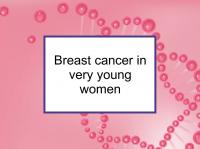Breast cancer in very young women has a different profile from breast cancer in middle age. We define “very young” for purposes of this webpage as up to age 35, although some of the findings below include somewhat older women. Approximately 2.4% of U.S. breast cancers are diagnosed before age 35 and 1% are diagnosed before 30.
Breast cancer in very young women appears to be the result of a combination of genetic, prenatal, environmental and lifestyle factors. Some young breast cancer patients have BRCA1 or BRCA2 mutations, but most do not. Please see also our article on steps young breast cancer survivors can take to help avoid a recurrence.
Recent advances have improved prognosis for young women
Although breast cancer at a young age has a reputation for poor outcomes, recent advances in treatment have improved the prognosis of young women. A 2022 Swiss study reported 91.4% survival at five years and 83.1% at 10 years among women ≤ 40 diagnosed with stage I-III breast cancer. Another study of women who were diagnosed at a median age of 37 reported a 10-year survival rate of 87%. Still another study of women diagnosed with early stage breast cancer between age 20 and 39 found 10-year survival of approximately 80%. Lumpectomy followed by radiotherapy appears to be as effective as mastectomy in young women with appropriate tumor characteristics, although there is not complete agreement on this. It also appears to be safe for some breast cancer survivors to have children eventually.
Breast cancer in young women should be treated as aggressive
Breast cancer in young women should be considered aggressive and treated as such even if the tumor characteristics would not warrant it in an older woman. Radiation treatment after surgery appears to improve survival for both those who have a lumpectomy and those who undergo mastectomy. Most young women would benefit from systemic treatment regardless of how small the tumor might be.
Prognosis is worse for women whose periods return after chemo
Young women in general, and BRCA1 mutation carriers in particular, should avoid iron deficiency, since it has been linked to higher risk of breast cancer in these populations.
On the other hand, the cessation of menstrual periods (which would tend to increase iron stores) is common among premenopausal breast cancer patients undergoing chemotherapy. Younger women and women who started menstruating before age 13 are the least likely to experience chemotherapy-induced amenorrhea. Women whose menstrual periods persist throughout chemotherapy or resume quickly after stopping for a few months have a poorer prognosis than women who experience permanent chemotherapy-induced amenorrhea. However, such women remain fertile and retain the possibility of having children.
Pregnancy and breast cancer
While having children eventually reduces breast cancer risk, pregnancy during the five years prior to a diagnosis of breast cancer appears to have a detrimental effect on survival. This effect is considerably higher when the time between breast cancer diagnosis and pregnancy is under two years. Women who are diagnosed shortly after delivery also have a poorer prognosis compared to breast cancer patients with no recent childbirth.
The question for young women who have already been diagnosed with breast cancer is how long to wait until becoming pregnant, assuming no relapse has occurred. Although it is important to wait least two years, there is some evidence that a longer delay would be safer. One study of women aged younger than 35 years at diagnosis found that the annual risk of recurrence was similar to that of lower-risk patients after 80 months. The authors conclude that it may be preferable to postpone a pregnancy beyond five years after breast cancer treatment.
However, several studies have reported results that contradict the above. One study found that women who are pregnant at diagnosis have only a slightly increased risk of death. Another reported that pregnancy after breast cancer treatment does not increase risk of recurrence even if the pregnancy occurs within five years of diagnosis.
Breastfeeding lowers the risk of breast cancer modestly and may also reduce risk of recurrence. The protective effect is strongest for triple negative (ER-/PR-/HER2-) breast cancer.
Below are links to 20 recent studies concerning this topic. For a more complete list of studies, please click on young age.
